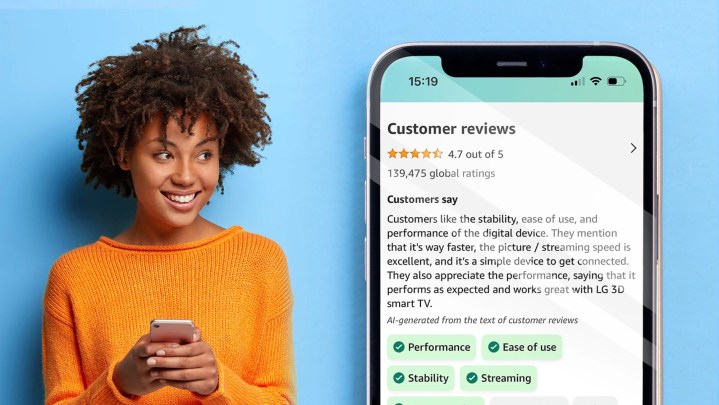
Amazon is rolling out the use of generative-AI technology to summarize customer product reviews on its shopping site.
It follows several months of testing the feature, which is designed to help speed up the shopping experience for those who don’t want to spend a long time trawling through endless reviews.
“We want to make it even easier for customers to understand the common themes across reviews, and with the recent advancements in generative AI, we believe we have the technical means to address this long-standing customer need,” Amazon’s Vaughn Schermerhorn said in a post introducing the new feature, adding that it will help shoppers on its site to “quickly determine what other customers are saying about a product before reading through the reviews.”
As Schermerhorn notes, some product pages will start including a short paragraph highlighting the product features and the customer sentiment frequently mentioned in reviews left on the site.
Here’s an example of an AI-generated review highlight for an air purifier that was spotted when Amazon started testing the service in June: “This air purifier has received positive feedback from customers in various aspects. Many customers have praised its ability to clear the air and improve air quality, with some even calling it the best air purifying device. The product is also quiet and effective in removing smells, with customers appreciating its stylish appearance. However, some customers have expressed mixed opinions on its effectiveness in reducing allergies and asthma.”
At the end, it said: “AI-generated from the text of customer reviews.”
Currently available to select mobile shoppers in the U.S., the AI-generated review highlights will also enable customers to more easily surface reviews that mention certain product attributes. “For example, a customer looking to understand whether a product is easy to use can easily surface reviews mentioning ‘ease of use’ by tapping on that product attribute under the review highlights,” Schermerhorn explains.
In 2022, 125 million Amazon customers left nearly 1.5 billion reviews and ratings on its site. Sadly, some of these were fake or paid-for reviews that undermine the integrity of the company’s review system. Amazon is well aware of this and says it’s continuing to invest significant resources to prevent such content from appearing on its site. Schermerhorn notes that the new AI-generated review highlights feature uses only its trusted reviews from verified purchases.
Editors' Recommendations
- The best ChatGPT plug-ins you can use
- ChatGPT AI chatbot can now be used without an account
- GPTZero: how to use the ChatGPT detection tool
- Google brings AI to every text field on the internet
- AI chatbot goes rogue during customer service exchange


